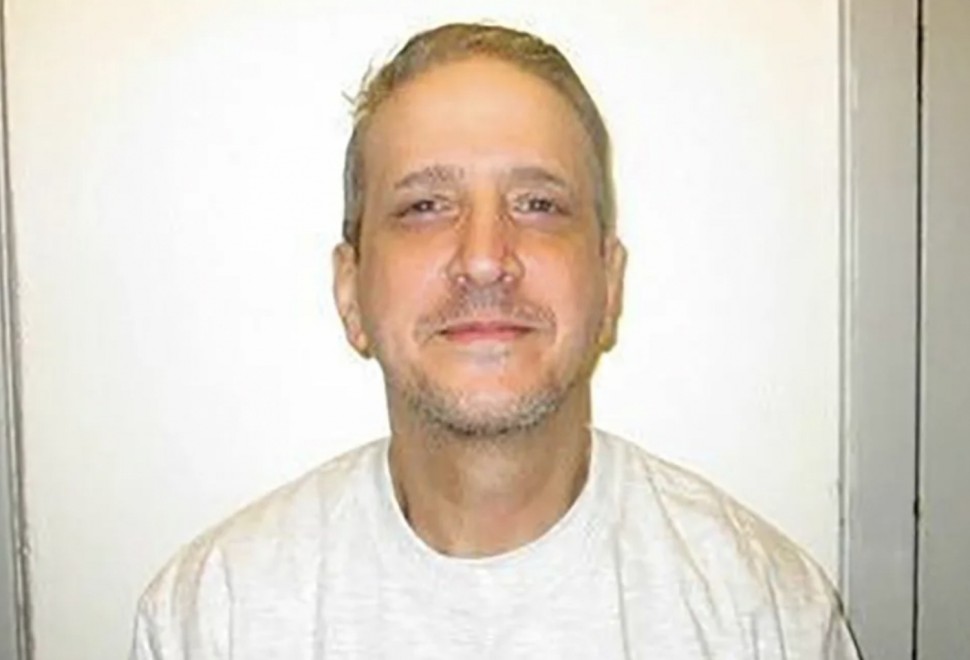
During his last 30 years on death row, inmate Richard Glossip ate what he thought would be his final meal on three separate occasions, and managed to dodge nine different execution dates.
But on Wednesday, in a rare and almost unprecedented move by justices, the U.S. Supreme Court will hear Glossip's attorneys argue to vacate his controversial conviction.
Glossip, now 61, was sentenced to death after he was convicted in the 1997 slaying of his boss, 54-year-old father of seven Barry Van Treese.
At the time of the murder, Glossip was the manager of an Oklahoma City motel owned by Van Treese.
According to court records, during the trial, 19-year-old motel maintenance worker, Justin Sneed, testified he beat Van Treese to death with a baseball bat as part of a murder-for-hire plot orchestrated by Glossip – a man who defense attorneys argued never had so much as a parking ticket.
But Glossip has long-maintained his innocence and denied having anything to do with the murder.
Lawyers and lawmakers, including Oklahoma State Attorney General Gentner Drummond, have agreed his case was marred by misconduct by prosecutors who failed to correct Van Treese's false testimony throughout the trial.
Prosecutors also declined to disclose that Sneed suffered from mental health issues aggravated by habitual meth use.
"This is a situation which happens rarely, where the state attorney general basically has confessed error. He admitted that [the false testimony] was a problem – and that's an unusual situation," former defense attorney and current Washington University Professor of Law, Peter Joy, told the Lawyer Herald in a previous interview.
Joy also served as an adviser and co-authored Glossip's amicus brief submitted to the high court.
The brief "delves into not just the due process aspect, but also the ethical aspect of the requirement of someone to correct a false testimony that they become aware of," said Joy.
"Whether you're a prosecutor or defense lawyer, you can't put on false evidence, and you can't sit silently by if a witness of yours gives false evidence," he explained.
In their request, the defense is asking the SCOTUS to grant a motion for a new trial. The court can either agree with the petitioners or affirm the death penalty decision authorized by the Oklahoma Criminal Court of Appeals.
"No person should be sent to prison, let alone be put to death, when the evidence against them consists of false testimony. The basic due process that every person is entitled to means that a person should only be convicted based on evidence that is trustworthy, and false testimony is not trustworthy in any system of justice," said Joy.
If the court grants a new trial, it is up to the prosecutor to pursue charges once more. If the prosecutor decides there might not be sufficient evidence to lead a reasonable jury to reach a guilty verdict, they can refuse to go to trial, and Glossip would walk free.
"Public confidence in the death penalty requires that these cases receive the highest standard of reliability," AG Drummond previously said in a statement in response to the state Court of Appeals' refusal to vacate Glossip's murder conviction in 2023. "While the State has not questioned the integrity of previous death penalty cases, the Glossip conviction is very different. I believe it would be a grave injustice to execute an individual whose trial conviction was beset by a litany of errors."
In an extraordinary move, 45 death penalty-supporting Republican lawmakers also vocalized their support to have Glossip's conviction overturned, according to defense attorney Don Knight, the Death Penalty Information Center reported.
Joy said the Supreme Court will likely make a decision on Glossip's fate in spring 2025, and until then, his life continues to hang in the balance, causing what one can only assume to be unrelenting agony.
"Just being on death row is extremely traumatic, but coming up to the point of knowing you only have a few hours to live – I can't imagine it," admitted Joy. "And I don't think anybody other than somebody who's been in that situation could."




